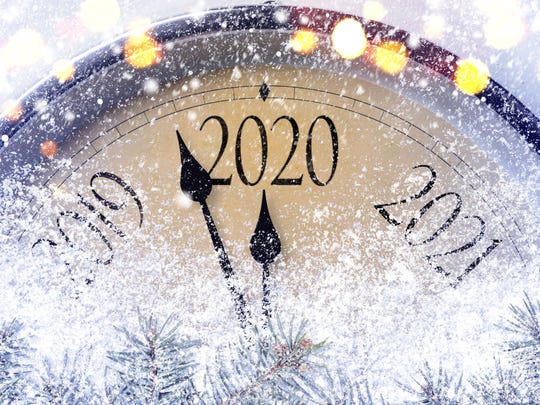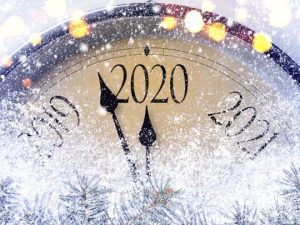2020 Happy New Decade! or is it?


 Every ten years the debate begins. Eye saw this coming, thanks to my 2020 vision!
Every ten years the debate begins. Eye saw this coming, thanks to my 2020 vision!
The year 2020 is just around the corner—and with it, the beginning of a new decade. Or do we have to wait until 2021 to celebrate the beginning of the twenties? Every ten years the debates begin.
Do decades officially begin with years ending in 0 or years ending in 1? Well, both are correct! It only depends on the words you use to describe decades.
Do Decades Begin with Round Years…
At first glance, it all looks logical and straightforward. Decades—periods of ten years—begin when the year count ticks over from a year ending with 9 to a year ending with 0. For example, New Year’s Day 1980 marked the beginning of the eighties. After all, they are called “the eighties” and not “the eighty-ones,” right?
IE: When you were born, you were days, weeks and months old. You were not Zero but you were not one year old. When you turned Ten you had lived Ten years.
When Centuries and Millennia Don’t?
Well, it does get a little more complicated when we look at centuries and millennia. Contrary to popular belief, the 21st century and the third millennium did not begin on January 1, 2000, but one year later, on New Year’s Day 2001. This may seem counter-intuitive at first, but it is a consequence of a defining feature of our modern time reckoning system: There was never a year zero, and year 1 BC was followed by year AD 1.
Depends on Language
So, how come this rule doesn’t apply to decades? Why do we claim that they can start with years ending in 0 or years ending in 1?
It all comes down to how we talk about time spans. With few exceptions, we usually think about centuries and millennia as numbered entities, counted up from year AD 1, such as “the 21st century” or “the third millennium.”
Decades, however, are commonly categorized based on the year numbers. For example, we say “the eighties” instead of “the 199th decade.” Similarly, the upcoming decade is technically the 203rd decade, but we call it “the twenties.” According to this common definition, decades generally encompass the time span from years ending with 0 to years ending with 9, such as 2020 – 2029.
By the way, the same could technically be said about centuries and millennia. It is factually correct to say that “the 1900s” began on January 1, 1900, just like New Year’s Day 2000 kicked off “the 2000s.” It’s just much more common to call these time spans the 20th and 21st centuries—and they began in 1901 and 2001, respectively.
Fun Fact: The origin of the word decade goes back to the Greek word Deka meaning ten and dates from the early 17th century.
But wait! There’s more!
Some say this decade ends on December 31, 2019, and the start of the new one begins January 1, 2020. For others, the new decade doesn’t start until January 1, 2021; the old one concluding on December 31, 2020.
As you think about New Year’s resolutions, here’s one we should all make together: resolve to insist that decades begin with the year ending in the numeral 1 and finish with a 0. For a decade to begin, we must start with the year ending with 1 (2021) and finish with 10, or so far as chronology is concerned, a year ending in 0 (2030).
For example, January 1, 2001, opened the 21st century and the start of the new millennium, just as the year 1 A.D. marked the beginning of the Christian era.
Calendrical Confusion
If you want to criticize anybody for this confusion, you can point the finger of blame at two men: Dionysius Exiguus, also known in some reference works as “Dennis the Short,” and the Northumbrian monk Bede, also known as the “Venerable Bede.”
Dionysius was born in what we now call Romania around the year 470 and was the first to suggest counting the passage of the years from the date of the birth of Jesus Christ; the beginning of the anno Domini (which means “Year of Our Lord” in Latin) era, or A.D.
According to the contemporary historians of the time, Jesus was born during the 28th year of the reign of the Roman Emperor, Caesar Augustus. There is, however, considerable confusion about exactly when Augustus’ reign began, so the year Dionysius called 1 A.D. was not accurately placed in history; in fact, most religious scholars now think that Jesus might actually have been born several years earlier.
When Dionysius finished his computations, he figured that the current year was then 525 A.D. But he never bothered to number the years prior to Christ’s birth.
We would have to wait until 731 A.D. when the Venerable Bede popularized the anno Domini era in Anglo-Saxon England and extended the counting of years before the birth of Christ – the “B.C. era.”
Most unfortunately, however, Bede did not account for the year zero in his calculations. So 1 A.D. was immediately preceded not by a 0, but by 1 B.C.
You pick your argument and go with it. I’m starting my new decade with 2020. Either way this year you get an EXTRA DAY! It’s Leap Year!
Maybe next year I’ll see things differently, hindsight is 2020.
How eye-ronic!



